
International Research Journal of Engineering and Technology (IRJET) e-ISSN: 2395-0056
Volume: 11 Issue: 05 | May 2024 www.irjet.net p-ISSN: 2395-0072


International Research Journal of Engineering and Technology (IRJET) e-ISSN: 2395-0056
Volume: 11 Issue: 05 | May 2024 www.irjet.net p-ISSN: 2395-0072
Kamal Ahmed1 , Mohammed Noorullah Khan2 , Mohd Adeeb Hussain3
1Assistant Professor, Department Mechanical Engineering, Vijay Rural Engineering College, Nizamabad, Telangana, India
2Student, Department Mechanical Engineering,Vijay Rural Engineering College,Nizamabad, Telangana, India
3Student, Department Mechanical Engineering, Vijay Rural Engineering College, Nizamabad, Telangana, India.***
Abstract - This research is about frame and load calculation and dimensioning, of the AGRIBOT. For the determination of forces on the elements, modelsanddrawings are to be made in CAD software like Catia and analysis by Ansys software. The quality mesh is prepared for a converged solution andthe solver is set as an analysis packagewithhighoptimizing results. The resultantcalculationparametercanbe used for modelling the geometry and fabrication of the prototype
Key Words: Agribot, Robotics, Agriculture Robot, Seed Sowing Machine.
Anagriculturalrobot (Agribot)isarobotdesignedfor agriculturalpurposes.Themainareaofapplicationofrobots inagricultureisattheharvestingstage.Fruit-pickingrobots, driverlesstractors/sprayers,andsheep-shearingrobotsare designedtoreplacehumanlabour.Theagriculturalindustry is behind other complementary industries in using robots because the sort of jobs involved in agriculture are not straightforward,andmanyrepetitivetasksarenotthesame everytime.
Inmostcases,alotoffactorshavetobeconsidered(e.g., the size and color of the fruit to be picked) before the commencement of a task. Robots can be used for other horticulturaltaskssuchasweeding,pruning,sprayingand monitoring.Robotscanalsobeusedinlivestockapplications (livestockrobotics)suchaswashing,milkingandcastrating.
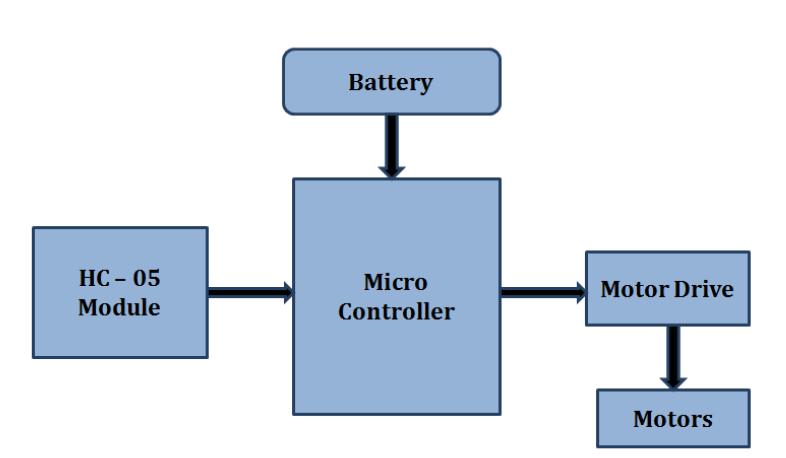
1.1. Problem Statement
Design an Agricultural Robot using a numerical approach (Mechanicalconstraints)
Proper analysis is necessary to develop a mechanismfortherobot. (Environmentconstraints)
1.2. Objective of the Research
A system designed to record and report within a process.
InthisprojectwedodesignusingCatiaandAnalysis is done using Ansys for the components of the project.
Inourprojectwetracktherobotbyusingwireless communication.
UsingmicrocontrollerwhichisProgrammableIC.
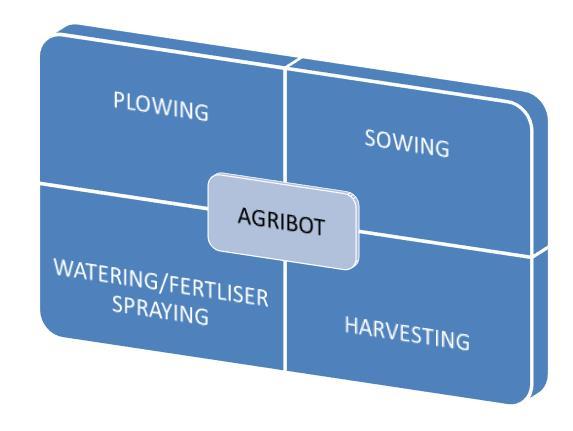
2. LITERATURE REVIEW
[1]. Jones, et al: "Vision-based Guidance for a Robot Tractor", this paper explores the improvement of visionbased guidance systems tailored for use in agricultura purpose, specifically focusing on their implementation in robottractors.

International Research Journal of Engineering and Technology (IRJET) e-ISSN: 2395-0056
Volume: 11 Issue: 05 | May 2024 www.irjet.net p-ISSN: 2395-0072
[2]. Zhang, et al: "Agricultural Robotics: A Review", this paper explores comprehensive review of the landscape of agriculturalrobot,coveringvarioustypesofrobotsandtheir applicationswithintheagriculturalpurpose
[3]. Murad, et al: "AutomatedHarvestingSystems:Recent Advances in Mechanized Harvesting of Crops", this paper explores advancements in automated harvesting systems, important components of agricultural robotics, focusing theirimportanceinmoderncropharvestingpractices.
3. Material and Methods
Theconsiderationsmadeabouttheprinciplesofthevehicle and the choices of concept for the mobile robot were: traction, steering, dimensions, frame, motors and power supply. The mechanical structure was designed by the studyingofworkingconditionsrequiredinfieldanddesired characteristics of the project, using the steps of processes described
S,no Compo nent Description
1 Frame In order to reach this requirement, the frame format adopted was the portico one,withadjustablegaugewhichislight and flexible when compared with the commercialagriculturalvehicles,withthe possibility of inserting new sensors and actuators
2 Traction In this Research, it was adopted a 4 wheelssystemandtoincreasetheability of vehicle to pull in adverse conditions, andindependent traction in eachwheel; primarily the system was dimensioned withfulltraction.
3 Steering As for the choice of structure configurationandcapabilityofadjustment of the gauge, a system that could be independent for each wheel, with easy constructionandaccuracyofsteeringwas chosen, and therefore we opted for the system Ackerman geometry in front wheels.
4 Motors The advantages of a brushed DC motor include low cost, high reliability, and simple control of motor speed. In this case, the DC motor which attends better the above demands can be used indoors andcanbesuppliedbybatteryandpower amplifiers, which makes it a flexible and easysolutiontoinstall
5 Power supply Theyaredesignedtobefullydischarged and recharged daily, can withstand
thousands of discharge cycles. For this works eight batteries of 12 V and 70 Ah fortraction,fourbatteriesof12Vand10 Ahforthesteeringsystemandonebattery of 12V and 50 Ah for the computing systemareused
Engineers and researchers work to increase the level of autonomousmachineryinagricultureandthebestsolution istodesignandbuildrobotscapabletoworkcontinuously withouthumanguidance.Robotsdeployedforagricultural purposescandeliverhighaccuracyandlowcostswhilethe farmers can have in real-time a situation of tasks already completed.
This Agribot is designed using CATIA V5 software. This software is used in automobiles, aerospace, goods, heavy engineeringetc.Itisverypowerfulsoftwarefordesigning complicated3dmodels,andapplicationsofCATIAVersion5 likepartdesign,andassemblydesign.
ThesameCATIAV5R203dmodeland2ddrawingmodel areshownbelowforreference.Dimensionsaretakenfrom. Thedesignofthe3DmodelisdoneinCATIAV5software, andthentodothetestweareusingthebelow-mentioned software.
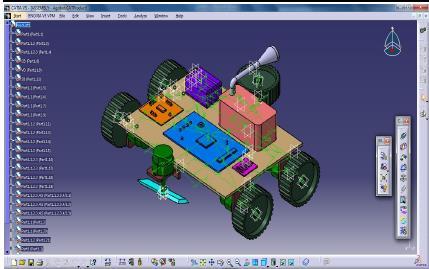
5. ANALYSIS OF AGRIBOT IN ANSYS SOFTWARE.
Aftercompletingthedesigningofeachcomponent next is to do an analysis based on the OEM (Original EquipmentofManufacturer)application.So,allthemodels whicharerotatedalongwhichaxisweneedtomentionin the Analysis software to get accurate results as per the

International Research Journal of Engineering and Technology (IRJET) e-ISSN: 2395-0056
Volume: 11 Issue: 05 | May 2024 www.irjet.net p-ISSN: 2395-0072
original component. Some of the components need to be solvedusingstaticanalysis
The analysis of the components is done using ANSYS. For compete assembly is not required, motor and attachedsystemistocarriedoutbyapplyingmomentsatthe rotationlocationalongwhichaxisweneedtomention.
5.1
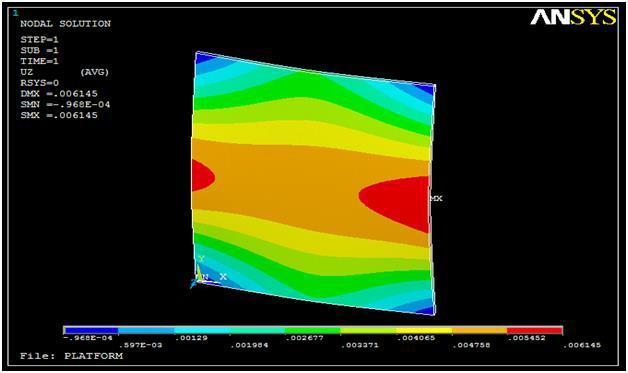
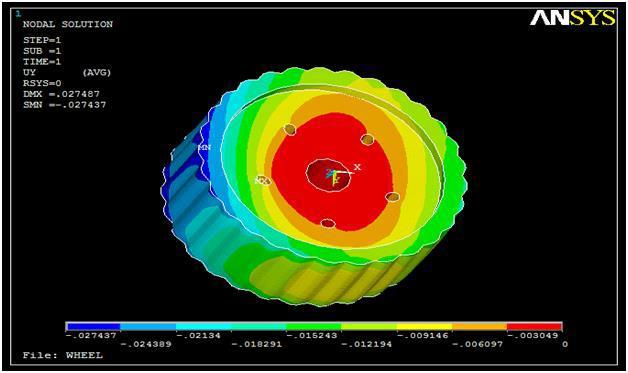
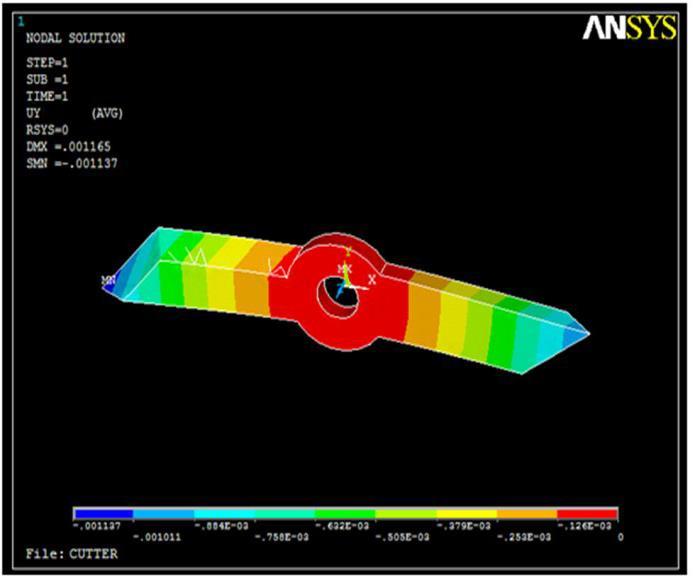
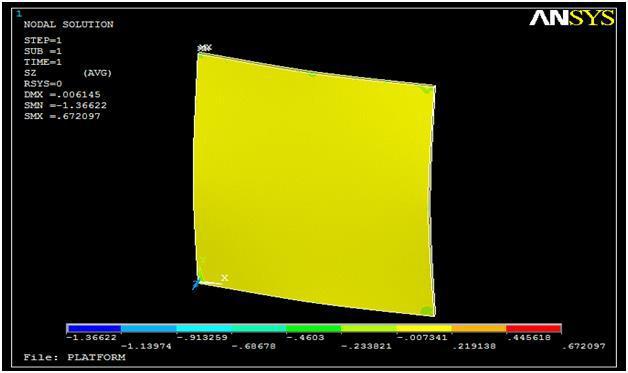
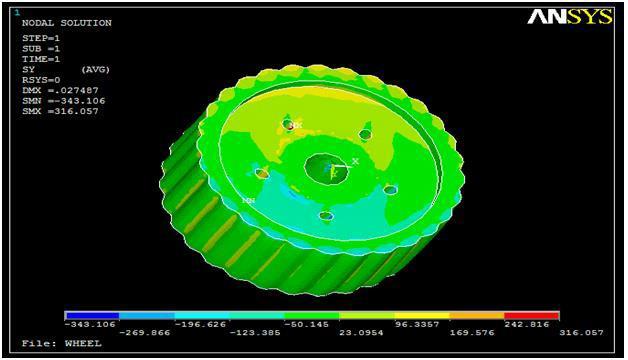

International Research Journal of Engineering and Technology (IRJET) e-ISSN: 2395-0056
Volume: 11 Issue: 05 | May 2024 www.irjet.net p-ISSN: 2395-0072
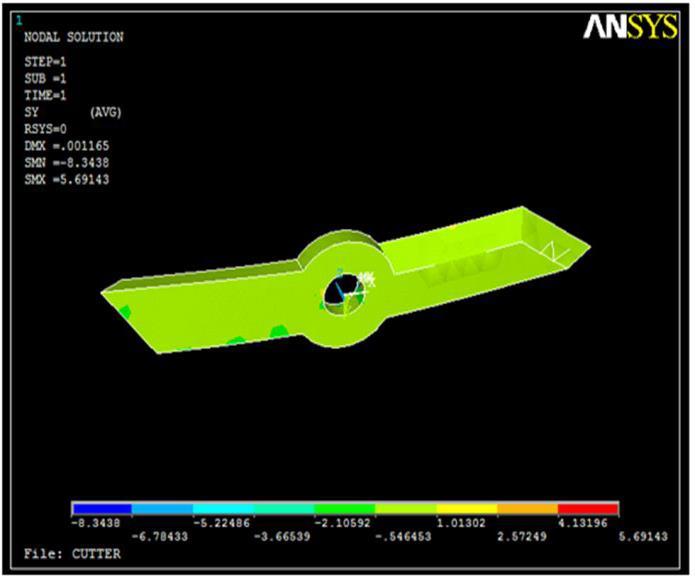
5.3 Results of stain analysis of Frame, Wheel and Cutter:
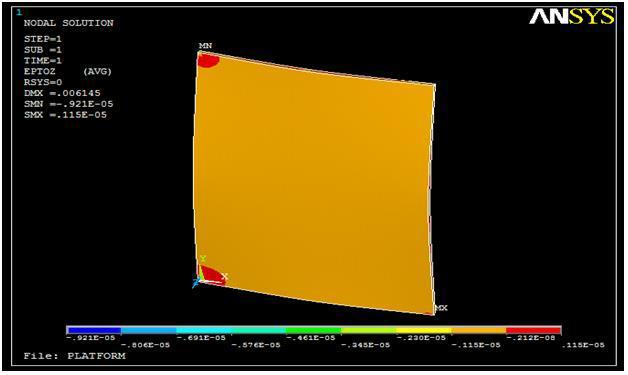
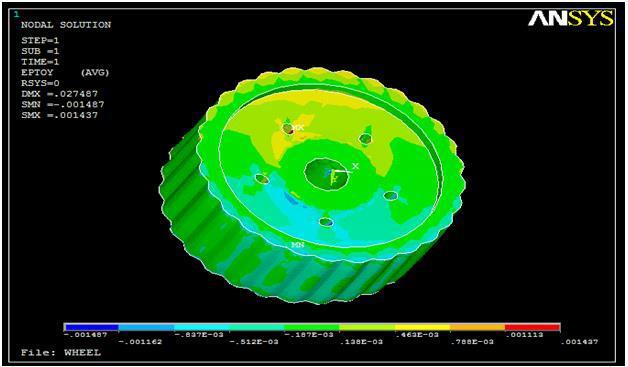
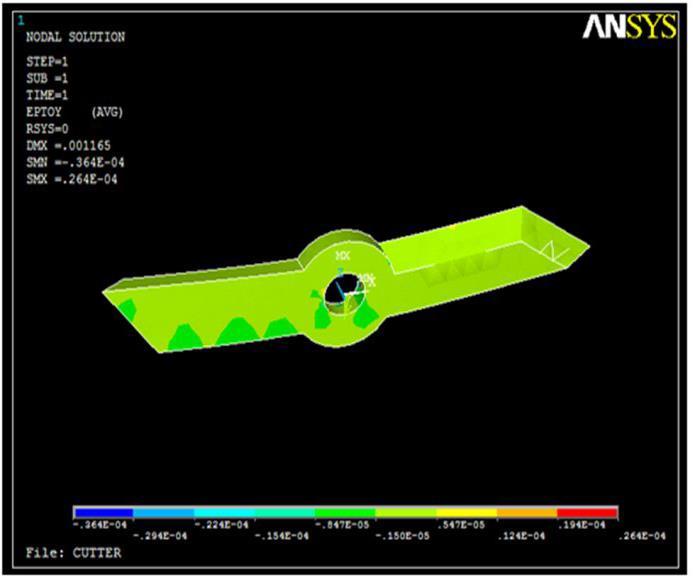
6.RESULT
As shown above figures, we are considering the AnalysisresultsofFrame,WheelandCuttertheofAgribotas it is the major working component in the project, so the displacementofthedesignismeshedandsolvedusingAnsys anddisplacement,whichisveryless.
This shows us that each component in the robot assembly has minor displacement and the prototype is fabricatedasperthedesign.
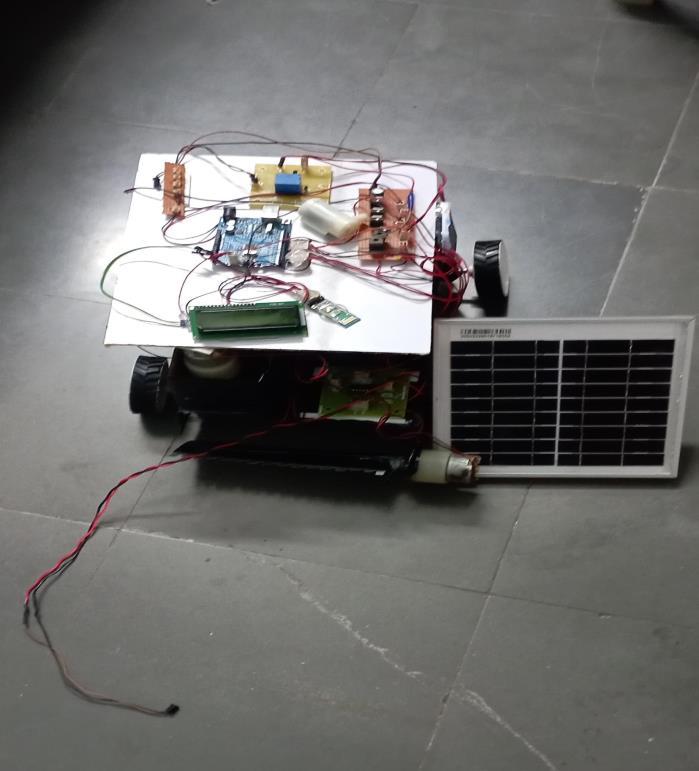

International Research Journal of Engineering and Technology (IRJET) e-ISSN: 2395-0056
Volume: 11 Issue: 05 | May 2024 www.irjet.net p-ISSN: 2395-0072
This paper has set out a vision of how aspects of cropproductioncouldbeautomatedinthefuture.Although existingmannedoperationscanbeefficientoverlargeareas thereisapotentialforreducingthescaleoftreatmentswith autonomous machines that may result in even higher efficiencies.
Stress is at the fixing location (Minimum Stress whichisacceptable),thevaluewhichisverylesscompared to yield value of Aluminum & Mild steel; this is below the yieldpoint.Themaximumstrain,thissolutionsolvingwith thehelpofAnsyssoftwaresothatthemaximumstressisless .so we can conclude our design parameters are approximatelycorrect.
[1].Jones,C.,&Meeussen,S.(2018).Designandanalysis ofanautonomousagriculturalrobotforvariablerate fertilization. Computers and Electronics in Agriculture,145,269-282.
[2].Zhang,Q.,&Huang,J.(2020).DesignandAnalysisof Agricultural Robot for Harvesting Sweet Pepper. IEEEAccess,8,67847-67856.
[3].Murad,M.A.,Ahmed,S.H.,&Haque,M.E.(2019). Designandfabricationofanagriculturalrobotfor cropcultivation.In2019InternationalConference on Robotics, Electrical and Signal Processing Techniques(ICREST)(pp.182-186).IEEE.
[4].Gu, Z., Cao, C., Zhao, S., & Wang, S. (2020). Design and Simulation Analysis ofAgricultural Robot Based on Virtual Prototyping Technology. In Proceedingsofthe3rdInternationalConferenceon ElectronicInformationTechnologyandComputer Engineering(pp.300-306).AtlantisPress.
[5].Shen,H.,Chen,X.,Li,H.,Sun,B.,&Sun,M.(2021). Design and simulation of an automatic milking robot for dairy cows. Journal of Physics: ConferenceSeries,1790(1),012025
BIOGRAPHIES


Kamal Ahmed,AssistantProfessor,Dept.of MechanicalEngineering,VREC,Nizamabad, Telanagana,India
Mohammed Noorullah Khan,Student,Dept. of Mechanical Engineering, VREC , Nizamabad,Telanagana,India

Mohd Adeeb Hussain, Student, Dept. of Mechanical Engineering,VREC,Nizamabad, Telanagana,India